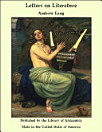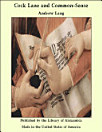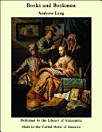Ballads in Blue China
sept 2020 · Library of Alexandria
eBook
99
Páginas
family_home
Apto
info
reportLas valoraciones y las reseñas no se verifican. Más información
Información sobre este eBook
Thirty years have passed, like a watch in the night, since the earlier of the two sets of verses here reprinted, Ballades in Blue China, was published. At first there were but twenty-two Ballades; ten more were added later. They appeared in a little white vellum wrapper, with a little blue Chinese singer copied from a porcelain jar; and the frontispiece was a little design by an etcher now famous.
Thirty years ago blue china was a kind of fetish in some circles, aesthetic circles, of which the balladist was not a member.
The ballade was an old French form of verse, in France revived by Theodore de Banville, and restored to an England which had long forgotten the Middle Ages, by my friends Mr. Austin Dobson and Mr. Edmund Gosse. They, so far as I can trust my memory, were the first to reintroduce these pleasant old French nugae, while an anonymous author let loose upon the town a whole winged flock of ballades of amazing dexterity. This unknown balladist was Mr. Henley; perhaps he was the first Englishman who ever burst into a double ballade, and his translations of two of Villon's ballades into modern thieves' slang were marvels of dexterity. Mr. Swinburne wrote a serious ballade, but the form, I venture to think, is not 'wholly serious,' of its nature, in modern days; and he did not persevere.
Nor did the taste for these trifles long endure. A good ballade is almost as rare as a good sonnet, but a middling ballade is almost as easily written as the majority of sonnets. Either form readily becomes mechanical, cheap and facile. I have heard Mr. George Meredith improvise a sonnet, a Petrarchian sonnet, obedient to the rules, without pen and paper. He spoke 'and the numbers came'; he sonneted as easily as a living poet, in his Eton days, improvised Latin elegiacs and Greek hexameters.
Thirty years ago blue china was a kind of fetish in some circles, aesthetic circles, of which the balladist was not a member.
The ballade was an old French form of verse, in France revived by Theodore de Banville, and restored to an England which had long forgotten the Middle Ages, by my friends Mr. Austin Dobson and Mr. Edmund Gosse. They, so far as I can trust my memory, were the first to reintroduce these pleasant old French nugae, while an anonymous author let loose upon the town a whole winged flock of ballades of amazing dexterity. This unknown balladist was Mr. Henley; perhaps he was the first Englishman who ever burst into a double ballade, and his translations of two of Villon's ballades into modern thieves' slang were marvels of dexterity. Mr. Swinburne wrote a serious ballade, but the form, I venture to think, is not 'wholly serious,' of its nature, in modern days; and he did not persevere.
Nor did the taste for these trifles long endure. A good ballade is almost as rare as a good sonnet, but a middling ballade is almost as easily written as the majority of sonnets. Either form readily becomes mechanical, cheap and facile. I have heard Mr. George Meredith improvise a sonnet, a Petrarchian sonnet, obedient to the rules, without pen and paper. He spoke 'and the numbers came'; he sonneted as easily as a living poet, in his Eton days, improvised Latin elegiacs and Greek hexameters.
Valorar este eBook
Danos tu opinión.
Información sobre cómo leer
Smartphones y tablets
Instala la aplicación Google Play Libros para Android y iPad/iPhone. Se sincroniza automáticamente con tu cuenta y te permite leer contenido online o sin conexión estés donde estés.
Ordenadores portátiles y de escritorio
Puedes usar el navegador web del ordenador para escuchar audiolibros que hayas comprado en Google Play.
eReaders y otros dispositivos
Para leer en dispositivos de tinta electrónica, como los lectores de libros electrónicos de Kobo, es necesario descargar un archivo y transferirlo al dispositivo. Sigue las instrucciones detalladas del Centro de Ayuda para transferir archivos a lectores de libros electrónicos compatibles.








